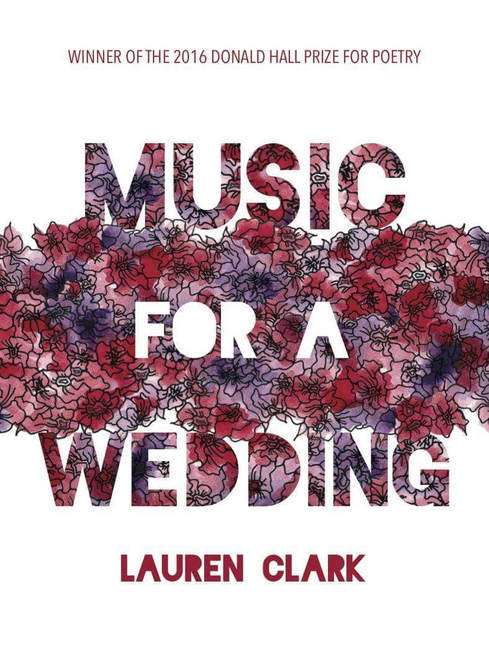Review by Alicia Marie Brandewie
Lauren Clark’s Music for a Wedding (University of Pittsburgh Press, 2018), selected by Vijay Seshadri as the Winner of the 2016 Donald Hall Prize for Poetry,confronts our fear that intimacy and vulnerability are too often both simpler and far more painful than we want to admit. In the book’s opening poem, Clark compares this to eating honey from a lover’s spoon then later asks of the same lover in the middle of the night: ‘I ask you a question. I have not spoken it before./ And through sleep you answer—not I do, or I will,//or even yes, or silence. You say As long as I can.“
Clark’s ability to harness dialogue in other people’s voices is devastating, from this opening lover’s shattered expectations, to the sexist police officer who compounds the trauma of a sexual assault by calling it “ecstatic, almost Bacchic”, to the mother’s almost omniscient qualities, her digs and directions; “The person you think you love is just a figurehead.” Through these exchanges Clark arcs a full-bodied cast of characters: an evolution of lovers and partners, a devolution of their relationship with , a volution with the mother, and a revolution of the self.The occupation of the book is coupling, as the title Music for a Wedding signals, but the unison is as much an internal one, as a romantic familial or cultural one. And in America today, coupling implies divorce, division, and wholescale rejection for about half of all partnerships.
Such changing and reshaping also reforms Clark’s views on the socialized definition of coupling, shame, and satisfaction; relationship to physical place, especially the Midwest; moving from craving safety to creating it; and embodying sexuality and gender. The poem “Listening to ‘Rolling in the Deep’ for Twenty Hours Straight” runs its fingers through all of these themes, leaving a wake in the psyche with the lines “the cornfield taught me how much/ can be mistaken for the touch of a human.”
The generosity of this collection—from the opening epigraph to the closing poem, and every vulnerability in between—would be necessary at any point in humanity, but is especially valuable in today’s dire cultural tectonic uprisings and submergings. And Clark is well-versed , pun deliciously intended, from the Latin of Catullus to the measures of the Kinks, Whitney Houston and Adele’s power ballads, The Lonesome Sisters, Gérard Grisey, Weezer, and Derek and the Dominos.
Clark uses disarmingly contemporary language to address ageless crises of love, belonging, self, grief, fulfillment, desire, and safety. The result is an uncannily prophetic quality in both the unvarnished statements and complex images. There are heart-splitting moments of clarity: “Hey. Hey. Things/ don’t just get better after awhile” in the opening section of the book; “Being away from what you know is the larger part of life,” in the third section; and in the concluding section, “we do the right ritual.// The one in which metaphor stops being habit/ and becomes real.” There are also moments that prophesy equally well but through denser layers of language and syntax: “her head on my pudendum”—a noun for external genitalia from the Latin verb to be ashamed—, and the 6th section of “Epethalian” “Afterparty”, “(After which everyone/ aside from the beloved/ goes home.)(See pg. 37.)” Wherein they literally, and metaphorically, burn it all down.
Music for a Wedding is a journey from who we are told to be, through who we try to be, to who we delight in being. Fom epithalamion to antiepithalamion. From death as “without you I am unsalvageable,/ my family is dead. The funeral, // when it happens, is late and offensive” to “the trick is to greet mortality with familiarity.// The trick is to plan the party in advance.” There is grace as wide as a Midwestern field in these pages, like the “Parable” poem set in the alcoholic, abusive father’s house, where a metaphorically too-short leg is still directly praised: “Leg,// I can love your shortcomings. Look at us as a set that walks.” away from the hellacious “” the father lives inThe poem “Vigil” is also full of grace: “It was metaphorical and a literal train ride” at the end of the collection, and after a rightful accumulation of bitterness, grief, and frustration, here are “new daffodils,/ old daffodils, don’t tell me I can’t/ have flowers in my poem.”
In an era when the world seems to find new ways to fall apart everyday, reading and writing poetry can seem “late and offensive, ridiculous as a wedding cake.” Other times “it was beautiful if unncesssary”, but we must not forget that there is a deep resistance in taking another’s body into your own through the mindful, intentional consumption of language in servings over 280 characters, in cultivating empathy, in earning the destination of “finally, you have come to the place/ that is bigger than loss”, of being in a place wholly your own.